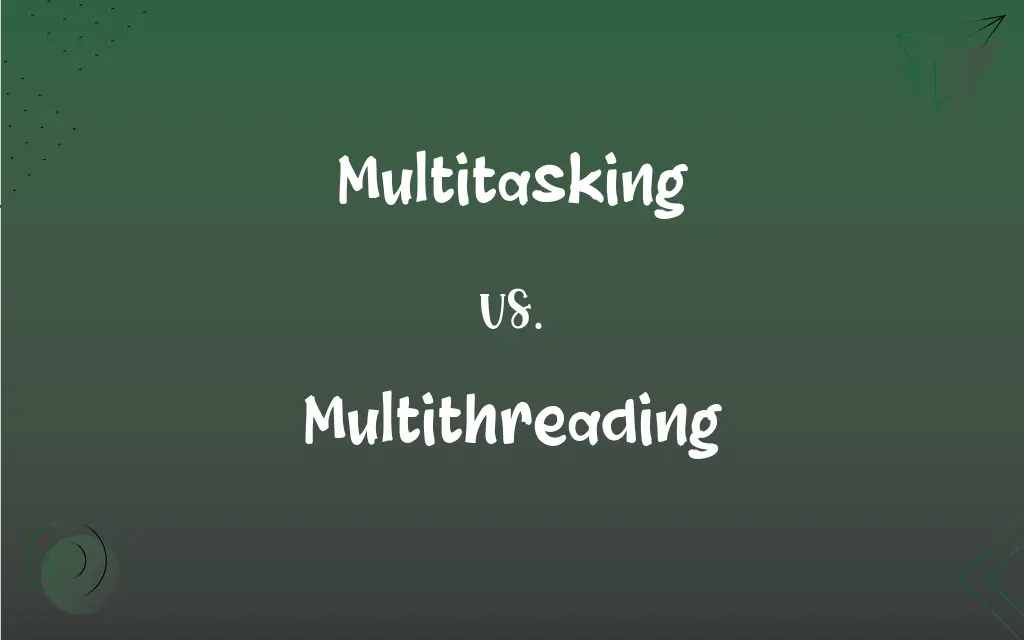Multitasking vs. Multithreading: What's the Difference?
Edited by Janet White || By Harlon Moss || Updated on October 15, 2023
Multitasking involves running multiple tasks or processes concurrently, while multithreading splits a single task into smaller threads running in parallel.

Key Differences
Multitasking and multithreading are both techniques used in computing to optimize the execution of tasks. While both deal with concurrent execution, their fundamental principles and applications differ. Multitasking allows multiple tasks or processes to share system resources, enabling the computer to appear as if it's doing several operations simultaneously.
In contrast, multithreading specifically refers to the concurrent execution of multiple threads within a single process. A thread is the smallest unit of CPU execution. Multithreading enhances the efficiency of a program by dividing a process into multiple threads that can run concurrently, leveraging the capabilities of modern multi-core processors.
While multitasking focuses on maximizing the utilization of CPU by switching between different tasks, multithreading aims to improve the throughput and performance of a single application. Multitasking can involve several unrelated applications, such as running a web browser and a word processor at the same time. Multithreading, on the other hand, is about splitting a single application into smaller threads to achieve parallelism within the application itself.
Both multitasking and multithreading have their challenges. With multitasking, there can be resource contention as multiple processes vie for system resources. In multithreading, challenges like thread synchronization, race conditions, and deadlocks can arise. Despite these challenges, both concepts significantly contribute to the efficiency and speed of modern computing systems.
Comparison Chart
Definition
Running multiple tasks concurrently
Running multiple threads within a single task
ADVERTISEMENT
Unit
Process or Task
Thread
Application
Multiple applications
Single application
Goal
Maximize CPU utilization
Improve throughput and performance
Challenges
Resource contention
Thread synchronization, race conditions
Multitasking and Multithreading Definitions
Multitasking
Switching between tasks to maximize CPU utilization.
Efficient multitasking requires good memory management.
ADVERTISEMENT
Multithreading
Concurrent execution of threads within a process.
The database system benefited from multithreading to handle multiple queries.
Multitasking
Sharing system resources among multiple processes.
With multitasking, she could run her spreadsheet software while downloading files.
Multithreading
Dividing a process into smaller concurrent threads.
Her software utilized multithreading to speed up data processing.
Multitasking
The ability of an OS to handle different processes at once.
Modern operating systems have improved multitasking capabilities.
Multithreading
Achieving parallelism within a single application.
Multithreading is essential for modern multi-core processors.
Multitasking
Running different applications simultaneously on a computer.
Multitasking allows him to design graphics while watching tutorials.
Multithreading
Enhancing a program's efficiency with parallel threads.
Graphics rendering software often employs multithreading for better performance.
Multitasking
Concurrent execution of multiple tasks.
His computer was multitasking between the browser, word processor, and music player.
Multithreading
Technique to optimize a task's execution in computing.
To boost the simulation speed, they incorporated multithreading.
Multitasking
The concurrent operation by one central processing unit of two or more processes.
Multithreading
(computing) The use of multithreaded code.
Multitasking
The engaging in more than one activity at the same time or serially, switching one's attention back and forth from one activity to another.
Multitasking
Present participle of multitask
Multitasking
(computing) The simultaneous execution of multiple tasks (programs) under the control of an interrupt-driven operating system.
Multitasking
The practice or capability of handling more than one task at the same time.
FAQs
Does multitasking always improve efficiency?
Not necessarily. For humans, multitasking can sometimes reduce focus and efficiency on each task.
Can multitasking lead to errors?
Yes, if tasks require attention and precision, multitasking can lead to mistakes.
What is multitasking?
Multitasking is the capability of a computer or an individual to manage or execute more than one task simultaneously.
Is multitasking limited to computers?
No, humans can also multitask, like talking on the phone while cooking.
How does a computer multitask?
Computers rapidly switch between tasks, giving the illusion of simultaneous execution.
How does an OS support multitasking?
An OS uses scheduling and context switching to give each task a slice of CPU time.
Does multitasking affect battery life in devices?
Yes, running multiple tasks can drain a device's battery faster.
What is multithreading?
Multithreading is a programming technique where multiple threads execute independently but share the same resources like memory space.
Which is more resource-intensive: multitasking or multithreading?
Multitasking is generally more resource-intensive as it deals with multiple separate processes, each with its own memory and resources.
How do developers manage multithreading challenges?
They use synchronization tools, locks, and careful design patterns.
Are there risks to multitasking in computing?
Yes, excessive multitasking can cause system slowdowns or crashes if resources are over-utilized.
Is multithreading suited for all applications?
Not always. Some tasks are better executed sequentially without the complexity of multithreading.
What's a thread in computing?
A thread is the smallest unit of a CPU's execution, often a part of a larger process.
How does multithreading differ from multitasking?
While multitasking manages multiple tasks or processes, multithreading manages multiple threads within a single process.
Is multithreading always efficient?
It depends. Properly implemented multithreading can improve performance, but poor implementation can lead to issues like thread contention.
Why is multithreading important?
It can help in better resource utilization, faster execution, and responsive applications.
Can a computer do both multitasking and multithreading?
Yes, modern computers can execute multiple tasks (multitasking) with each task potentially having multiple threads (multithreading).
Which programming languages support multithreading?
Many languages like Java, C++, Python, and others offer multithreading support.
Which is more challenging to implement: multitasking or multithreading?
It depends on the context, but multithreading often presents more intricate challenges due to shared resources and potential deadlocks.
About Author
Written by
Harlon MossHarlon is a seasoned quality moderator and accomplished content writer for Difference Wiki. An alumnus of the prestigious University of California, he earned his degree in Computer Science. Leveraging his academic background, Harlon brings a meticulous and informed perspective to his work, ensuring content accuracy and excellence.
Edited by
Janet WhiteJanet White has been an esteemed writer and blogger for Difference Wiki. Holding a Master's degree in Science and Medical Journalism from the prestigious Boston University, she has consistently demonstrated her expertise and passion for her field. When she's not immersed in her work, Janet relishes her time exercising, delving into a good book, and cherishing moments with friends and family.































































